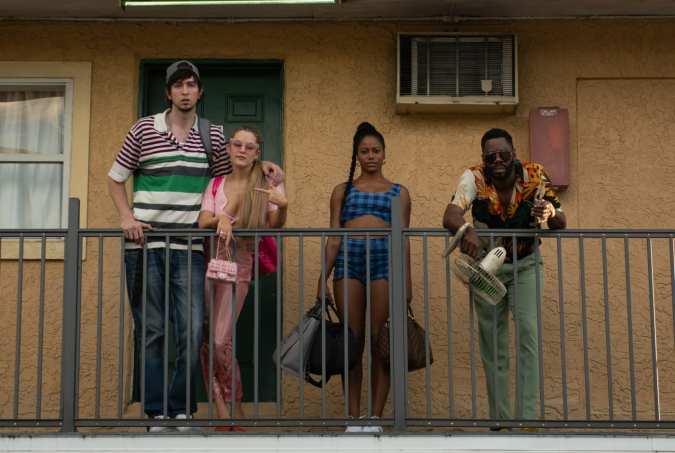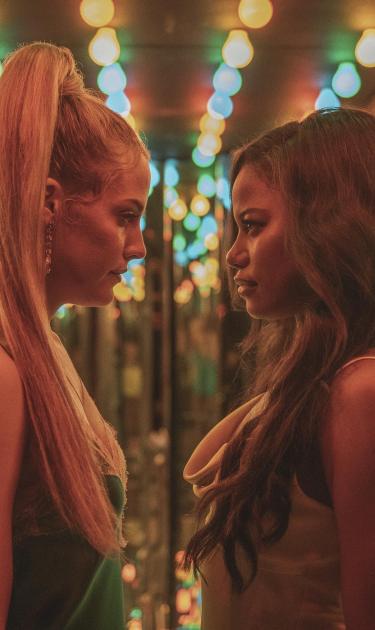A24 film Zola has become an instant summertime joyride with Panamanian-American director Janicza Bravo in the driver’s seat of the dark comedy. Inspired by a 148-tweet viral thread by exotic dancer Aziah “Zola” Wells — coined #TheStory on Twitter in October 2015 — the film chronicles a spontaneous weekend trip to the underbelly of Florida. Fellow dancer Jessica deceptively lures Wells into the gun-toting hustle of sex trafficking. Following Wells’ thread in real-time, Bravo was captivated by the sexcapade of epic proportions.
A theatre graduate of New York University Tisch School of the Arts, Bravo recognized #TheStory as a future cult classic. Taking the reins as the director of Zola in 2018 — after actor-director James Franco left the film’s initial production — Bravo teamed with Slave Play playwright Jeremy O. Harris to co-write the screenplay. Wells’ narrative soon transformed into a hallucinogenic tale with baby hairs galore, sensory-overload Twitter bird notification tones, Car Stuck Girls fetish clips, and unsettling Blaccents. The film’s omnipresent phrase is “safe travels,” but the uneasiness of the tragicomedy is anything but.
With Zola as the newest installment in Bravo’s portfolio — which includes her 2017 debut film Lemon and the 2016 surrealist, microaggressive “Juneteenth” episode of FX series Atlanta — she has reinforced her status as a filmmaker on the rise. Bravo spoke with Remezcla about buzzworthy internet culture, her Panamanian origins, and defying Twitter’s visual expectations of #TheStory.
How has it been to see this anticipation for Zola after the Twitter thread was nearly six years ago? Were you concerned that the story would be forgotten?
When I hear that [#TheStory] was six years ago, that seems kind of wild only because 2015 in some ways doesn’t feel that long ago, but so much life has happened in the last six years. So much has happened in the last year, alone. I never questioned the relevance of the piece because it felt timeless in a lot of ways.
Zola is about fast friendships, falling in and out of love with one another, and [and] the road to finding one’s voice. It’s also about sex work and sex trafficking.
What visual aspects of your background has remained with you as a filmmaker?
Both of my parents are Panamanian, I was born in New York in 1981, and I moved to Panama when I was a baby. The majority of my family has been there. I have a lot of family in the U.S, but I lived in Panama until I was about 12-years-old. Panama is through-and-through my home even though I’ve lived in [the U.S.] for longer than I have lived anywhere else.
The visual aspects of Panama that stay with me probably have something to do with the palette. The palette that I’m most attracted to tends to be a bit more saturated. Even though my first and second features are colored very differently — Zola is a bit more candy, whereas Lemon is dipped in the warmest part of the coloring box, I think both have a storybook quality.
The film seems to be a culmination of things that social media has discussed in the last few years: America’s fascination with Florida and ‘Blackfishing.’ How closely were you following internet culture while filming Zola?
To me, the film is a love letter to the internet, and it is a love letter to 2015 as a time capsule. I shot the movie in the fall and winter of 2018. In writing the film with Jeremy [O. Harris] and conceiving the world of the film — even with my music supervisors —we talked a lot about treating 2015 like it was archival.
You should watch the movie and feel like it’s a period film even though it was only six years ago. Six years ago, in some ways, is not that long ago, but so much life happened between even 2015 and 2016. For instance, there isn’t any Vine mentioned in the Twitter thread, but I wanted there to be Vine because I wanted us to be reminded of the precursor to TikTok. Once you put [Vine] in there, it almost feels a bit like a time capsule. It’s a snow globe.
Sex work is still taboo in entertainment, especially in terms of being told from a woman’s perspective. The Rolling Stone article was once given more prominence than the Zola Twitter thread. What was the process of gaining A’Ziah’s trust to retell her story?
There really isn’t such a thing as Twitter IP in a way, like they own the material. One of the entry points in being able to get the rights to this story is through getting the rights to an article and also buying A’Ziah’s life rights. I showed up a couple of years after this, so that was how the original producers got into the project.
I met A’Ziah and her mother after I got the job [as Zola director], and they gave me my final blessing. I have a memory of a conversation that’s something to the effect of, “I’m asking you to give me the keys to the story that you told, and all I can say is that I’m going to do my best by you. All you have is my word because you don’t know me. My body of work before this isn’t necessarily an audition for what I want to do here and what my approach is.” We just worked in community. We worked hand-in-hand.
Zola’s [visual] aesthetic is soft, and I noticed that the score was quite dreamy despite the film having a stressful tone. What was the intention behind this?
I don’t think they’re in juxtaposition. I think they’re quite parallel, which holds the quality of the world. Some of the film’s approaches were to tell the story through this young woman’s eyes and paint a better visual than what might have been the actual circumstance.
The idea was: She had lived this. It was totally okay to tell a better version of what happened and to dress it, photograph it, and sonically bathe it perhaps better than what it had looked like. Basically, to stylize the world and tell it in hyperbole, so it felt like we were being presented with a story with a clear beginning, middle, and end through one person’s perspective.
Although the film was titled Zola, it switches briefly to another character’s narrative. Does this speak to the larger conversation of A’Ziah losing agency of her story?
When the thread came out in 2015, two of the other characters retold the story within days after. One version was told on Reddit, and another was told on Facebook, and [including those stories] were meant to homage this time capsule moment. Their stories are relatively identical. It’s just that each person recasts themselves and rewrites the narrative.

Was there difficulty in centering the discomfort of the trip? Zola was humorous, but I think many people were expecting Zola to be a caricature of herself.
The experience of reading and the experience of mounting are totally different. There are people who read the Twitter thread, saw the movie, and told me, “I thought the thread was so much funnier.” I then suggested that they go back and read it because I think their experience of reading it was really funny, but if you look behind the lines, there is a good deal of not funny.
For instance, there is this line that people talk about a lot which is “Pussy is worth thousands,” which is a great piece of text. This woman has had sex with a man for $150, and another woman is telling her that she is worth more. After she charges $500 for sex, what ensues is a night where she sleeps with 20 men. On the first read, without stopping and analyzing line-by-line, a moment like “Pussy is worth thousands” only reads as comedy. If you actually look at it from a 360-degree view, there’s something really serious happening inside of it.
Considering that [you fought] for the rights of Zola and A’Ziah’s compensation, what would you say to Black and Latina women who are underestimated and disillusioned about becoming a filmmaker?
I read the Twitter thread, and I wanted to make that movie. Once I was able to put my name in the hat, I found out there were a lot of people who were offering actual money, whereas I was offering something creative. I wasn’t in real consideration then, I stepped in three years later after the last director [James Franco] stepped down, and I went after it. It was after going after Zola then that I got it.
My advice around feeling disillusioned in this business: I don’t know a creative venture that doesn’t include a great deal of disillusionment. I don’t know a creative venture that doesn’t have some low-low-lows with some highs. If you really want this, accepting that [disillusionment is] an aspect of this journey is absolutely necessary.
I can speak to my own journey, and I am a woman of color journeying — perhaps there is a creator who doesn’t look like me whose experience would be very different. I don’t know a version of this road that doesn’t include a lot of rejection. So much of staying in it is definitely the handful of people I’ve found myself in community with, but it’s also knowing at my core that I’m supposed to be here.




